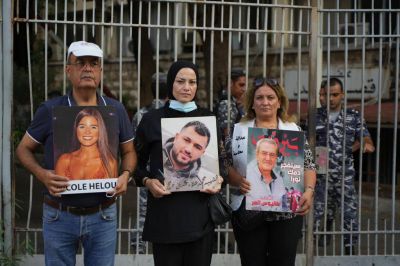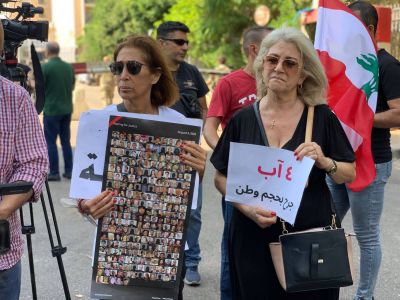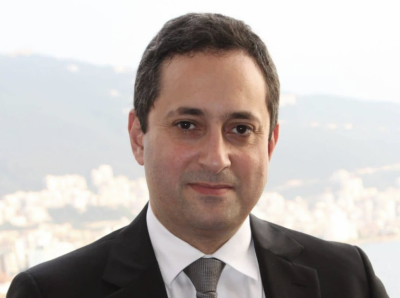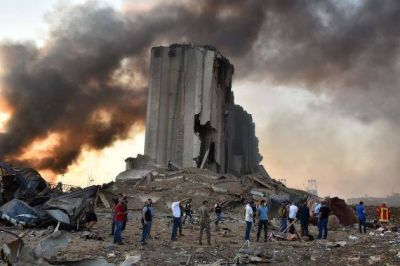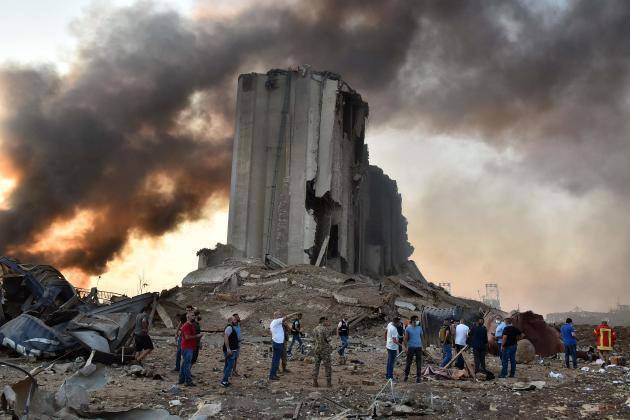
A view of the Beirut port silos after the 2020 explosion. (AFP file photo)
The Higher Judicial Council decided Sept. 6 to appoint a substitute investigating judge in the 2020 Beirut port explosion probe, while the current lead investigator, Judge Tarek Bitar remains in his post.
Is this measure aimed at undercutting Bitar? Many fear so.
The council’s decision came after a long meeting Tuesday during which its members approved in principle a proposal by caretaker Justice Minister Henry Khoury, who is known to be close to the Aounist camp, to appoint another magistrate — one who would be willing to rule in favor of requests for the release of detainees who had been indicted in the probe.
Under the council’s decision, Khoury could suggest a name, which the council could accept or reject.
The designated magistrate will then remain in office until Bitar, whose hands are tied because of appeals brought against him, can resume his investigation.
A judicial source close to the council said the decision was prompted by the need to deal with several cases of blast probe detainees whose health had deteriorated to the point where they had to be hospitalized.
“It would have been inhumane to turn a blind eye to such tragedies,” the source told L’Orient-Le Jour.
Severe blow
“It is a severe blow to the law and a humiliation of justice,” a senior magistrate, who did not wish to be named due to the sensitivity of the issue, told L’Orient-Le Jour.
“The code of criminal procedure provides for the appointment of a single investigating judge at the Court of Justice,” the magistrate explained, claiming that “only an amendment to the law would allow such a measure.”
According to the magistrate, Tuesday’s decision will result in torpedoing the investigation.
“The detainees will be released, and the victims and their families will be forgotten,” he warned.
Another senior judge warned that the country’s ruling class does not want to hold those responsible for the disaster accountable.
“They refused to give Judge Bitar permission to prosecute them, and now they want to cut him off after none of his decisions have been executed,” the judge told L’Orient Today.
According to the judge, by approving the appointment of a deputy, “the judiciary has created a point of confrontation with Tarek Bitar,” who will not recognize the council’s decision.
“Bitar would either withhold handing over any documents of the cases — even those in connection with the release of detainees — which means he could be referred to the Judicial Inspection Commission which could, in turn, dismiss him,” the judge said.
“Or he would resign from the judiciary,” he added. “Those who know Bitar know that he will no longer see in the judiciary a reflection of his ambitions and values, should such a measure be implemented.”
FPM threatening to escalate?
Recently, the Higher Judicial Council has been facing mounting pressure.
On Tuesday, the relatives of the port blast probe detainees held a sit-in in front of the Palace of Justice in Beirut. Earlier on that same day, a delegation comprising six Free Patriotic Movement MPs, as well as five lawyers and representatives of the families of the explosion victims and detainees, visited the Higher Judicial Council head Souheil Abboud.
The delegation, made up of MPs Casar Abi Khalil, Charbel Maroun, Jimmy Jabbour, Nada Boustany, Georges Atallah and Samer Tom, reportedly urged Abboud to accelerate the course of justice, including the issue of detainees. Among the detainees is former director of customs Badri Daher, who is close to the FPM.
In a clear attempt at escalation, on the sidelines of the meeting, the FPM MPs were quick to mention “tense altercations” between Maroun and Judge Abboud, according to a statement the delegation members made afterward. This statement came much to the surprise of sources close to the council, who said that during the meeting, the delegation members instead praised Abboud’s “integrity” and his capacity to “remain immune to any requests.”
Shortly after, the Aounist MPs had a change of heart when asked about the meeting.
“It was a normal discussion about the measures that hinder the smooth running of justice, which Charbel Maroun has pointed out,” MP Abi Khalil told L’Orient-Le Jour.
“We have not made any threats and we will decide on the next steps according to developments,” he added.
For her part, FPM vice president May Khoreiche called on the Higher Judicial Council to “do its job.”
“If the judge [Tarek Bitar] cannot put anyone behind bars, let him release those incarcerated,” she told L’Orient-Le Jour, lamenting the fact that the investigation is blocked.
Asked about possible escalation measures the FPM could seek, she said that “these measures will be decided with the relatives of the detainees and lawyers,” mentioning, however, “greater popular pressure,” in reference to street demonstrations.
Orchestrating pressure
At the same time as the FPM MPs were meeting with Abboud, Parliament Speaker Deputy Elias Bou Saab called on the Higher Judicial Council to revise the draft decree for appointing new members of the Court of Cassation’s plenary assembly.
Saab had proposed, as per the 1990 Taif Agreement, for five Christian presidents and five Muslim presidents of chambers to serve on the plenary assembly, in addition to a potential sixth member. After a recent meeting with President Aoun at the Baabda Presidential Palace, Saab advocated a decree for the appointments, based on equal Muslim-Christian distribution.
Saab, who does not have the authority to actually make the judicial appointments, had made this same request in July following talks with the president, prime minister and speaker. However, he took it up a notch yesterday by accusing the Higher Judicial Council of torpedoing the appointment of members of the high court.
“The Higher Judicial Council is directly responsible for obstructing the formation of the plenary assembly of the Court of Cassation,” Bou Saab said, adding that “there is a big question mark over who is the beneficiary of this obstruction,” without further elaborating.
New members of the assembly must be appointed to reinstate the six-member quorum, which was broken in April following the successive retirements of four presidents of the chamber of the Court of Cassation. Appointing the new members would allow the port investigation to restart.
Once completed, the court will be able to rule on appeals against the state alleging “serious faults” by Judge Bitar, as well as by Judge Naji Eid, who is looking into the appeals brought by Amal Movement MPs Ali Hassan Khalil and Ghazi Zeaiter — both of whom were implicated in the port probe — which have only further torpedoed the investigation.
Bou Saab also accused the council of “procrastinating” since April. At the time, Finance Minister, Youssef Khalil, had blocked appointments under the pretext that it did not respect the sectarian distribution.
A source close to the council rejected accusations of procrastination, instead blaming “the parties who do not want justice.”
“However, the council has fulfilled its role of appointing the members of the assembly, within the framework of the law and unanimously by its members,” the source told L’Orient-Le Jour.
This article was originally published in French in L'Orient-Le Jour. Translation by Sahar Ghoussoub.
